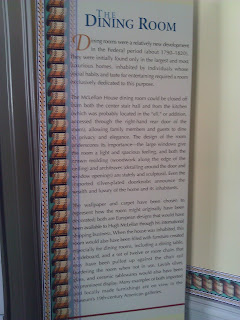Observations and
Reactions:
I walked into the McClellan house and immediately thought
of an old John Wayne movie. I don’t know why… perhaps it was the stairway.
Anyways, for a house that was built in 1800 it was in really nice condition. I
found it amusing that almost every room had a fireplace or woodstove. The walls
were a little weird in my opinion but other than that I thought it was a pretty
neat house. The whole house was very impressive as I thought, since it was in
such good condition, that it was like stepping back in time, as cheesy as that
sounds. The people inside the house were very quiet. I guess it is because it
is part of a museum. Maybe some people thought it was just a creepy setting
because of the wall paper.
Historical Background:
“The McLellan House (1801) is the product
of a post-Revolutionary building boom, fueled by the revival of an energetic
maritime economy, that transformed Maine's coastal towns and cities. The House
exemplifies the key role that architect-builders played in employing a new
architectural vocabulary to create homes that confirmed their owners' position
in society and became symbols of individual enterprise and public improvement”.
The McLellan House was built in
1800 – 1801. It was named after Hugh McLellan who owned Maine’s largest
shipping fleet and later founded the first bank and insurance company in Maine.
McLellan built the house for $20,000 at the time of construction. John Kimball
was the architect who designed it.
The shipping business came to a standstill when, in 1807,
the British Trade Embargo ceased all shipping. In 1817 the house was sold for
just over $4,000. The owner of the house would change several times until
Margaret Jane Mussey Sweat and her husband bought the house in 1880. She
redecorated the house in a Victorian style but did not alter the structure of
the house. Sweat was an artistic authority and knew that there was significance
to the house as a monument. When she passed away in 1908 she gave the house to
the Portland Society of Art (now the museum that it is attached to) along with
money for attaching an art gallery to the house. John Calvin Stevens built the
gallery and continued the architectural style from the McClellan House in the
gallery. However, some things like the wallpaper and some of the architecture
had been changed in the late 1950s which removed some of the Victorian themed
items from the house.
In
the year 2000 a fundraiser was set into place in order to raise 13.5 million
dollars for the preservation of the buildings that the Portland Museum of Art
has in its possession. In 2002 the Neoclassical style that the house originally
had was restored thanks to the money. To further the educational uses of the
house there have been placed, all over the museum and the McClellan House,
electronic screens and signs with general information about the house. In 2003
the museum received the National Preservation Honor Award for its efforts to
preserve its possessions. An excerpt reads ““As the leading
cultural institution in Maine, the museum has set a great example for
preservation through the restoration of the McLellan House and the Lorenzo de
Medici Sweat Galleries. This is an exemplary project in terms of collaboration
and teamwork among museum staff, local historians, and local craftspeople.”
These were the only pictures I took because I was not thinking for some reason.






No comments:
Post a Comment